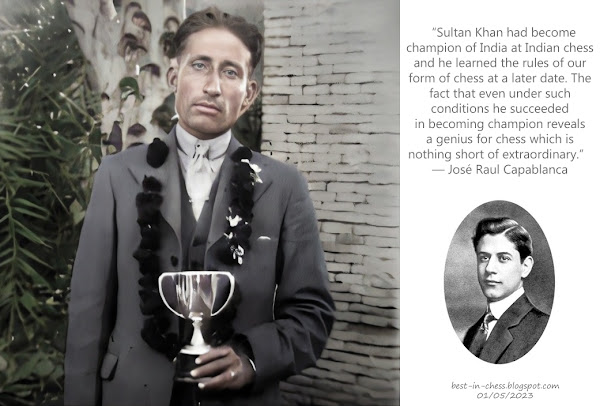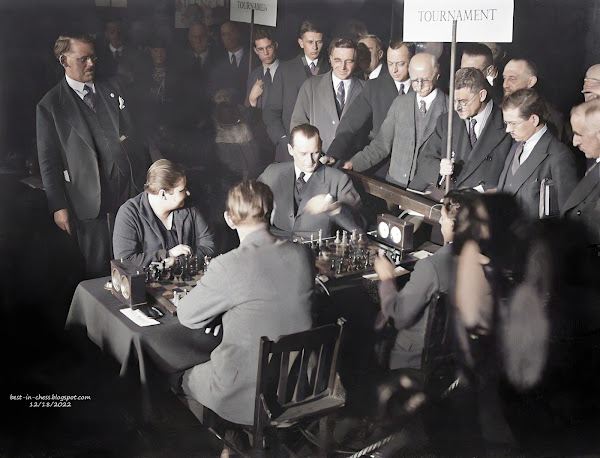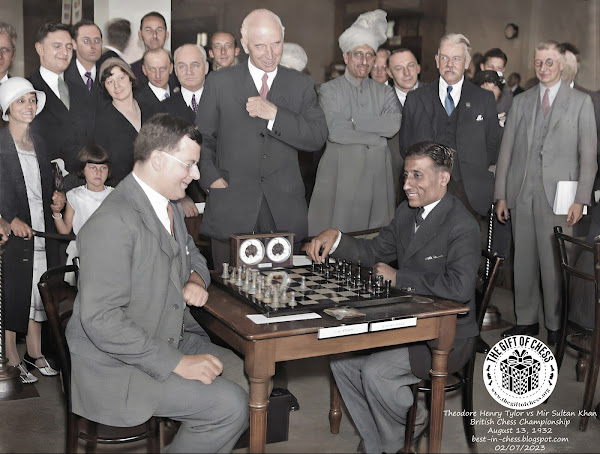Additional Games
Mir Sultan Khan
1905 - April 25, 1966
1931
Sultan Khan, 1931 plays 24 games simultaneously at the Empire Social Chess Club in England.
“Sultan Khan had become champion of India at Indian chess and he learned the rules of our form of chess at a later date. The fact that even under such conditions he succeeded in becoming champion reveals a genius for chess which is nothing short of extraordinary.” — José Raul Capablanca
February 01 1932
February 06 1932
 International Chess Festival 06 Feb 1932, Sat Cheltenham Chronicle and Gloucestershire Graphic (Cheltenham, Gloucestershire, England) Newspapers.com
International Chess Festival 06 Feb 1932, Sat Cheltenham Chronicle and Gloucestershire Graphic (Cheltenham, Gloucestershire, England) Newspapers.com
The first “Chess Festival” promoted and financed by a newspaper was opened at the Central Hall, Westminster, on Monday, and continued there all week. The second half will be conducted at the “Empire Social Chess Club,” at Whiteley's Stores, Bayswater, W., from Monday next to Saturday, when the prizes will be presented. The Congress is the only event of its kind and magnitude held in London since 1922. As we have previously mentioned it is provided by the “Sunday Referee,” and it is managed by Mr. W. Hatton-Ward, that journal's chess editor. There are no entry fees, and admission to see the play is free, by ticket, to be obtained from Mr. Hatton-Ward, “Sunday Referee,” 17 Tudor-street, London, E.C.4. But probably any player can easily gain admission next week at Whiteley's.
The chief tourney is the International Masters', with twelve competitors—Dr. Alekhine, Dr. Tartakower (Poland), Geza Maroczy (Hungary), Koltanowski (Belgium), I. Kashdan (U.S.A.), Salo Flohr (Czechoslovakia), Mir Sultan Khan, W. Winter, V. Buerger, and P. S. Milner Barry—who not many years ago was of Cheltenham College and at that time won the British Boys' championship.
Dr. Alekhine had a great reception when he appeared at the Empire Social Chess Club on Friday of last week and engaged in simultaneous play against twenty-four strong London opponents. He won all but two games, which were drawn by Dr. F. Duncan and Mr. A. Streeter. Another end encounter was fixed for to-day (Sat.) at 7 p.m. at the Central Hall, Westminster.
One of the prize tourneys is for women, and the entries include the strongest in this country except Miss V. Menchik. Her sister, Olga, is one. Both were playing in Cheltenham a few years since. There is considerable difference in chess strength.
The prizes.—These are, in the “Masters' Tourney”: 1st £50, 2nd £30, 3rd £20, 4th £10. In the “Premier Reserve”: 1st £10, 2nd £5, 3rd £3, 4th £2. And the same in women's tourney. Some anonymous chess patron gives £10 for the most brilliant or “best recovery game” played during the Festival.
August 27 1932
Liverpool Post and Mercury, Liverpool, Merseyside, England, Saturday, August 27, 1932
Sultan Khan The Chess Champion
C. Alexander Gains Second Place
From a Special Correspondent
London, Friday.
The tournament for the British Chess Championship, in London, ended to-night in a victory for Sultan Khan, the Indian master. C. Alexander, a young player for some years associated with chess at Cambridge and in the Midlands, was second, only half a point down.
When the final round opened Sultan needed only a draw for first prize, and was certain of a tie for that honour in any case. His last game was against Fairhurst, a dangerous opponent for any player. Sultan got no more than equality in the opening, while in the middle game after some early exchanges he lost a pawn, and had the inferior position. A long and difficult ending followed in which Fairhurst had knight and four pawns against Sultan's bishop and three pawns, and the issue was still undecided at the afternoon adjournment after seven hours of hard chess.
Final Results
At night Sultan secured a draw on the seventy-first move. Sir George Thomas finished third and R. P. Michell fourth.
The final scores were:— Sultan 8½,
C. Alexander 8,
Sir George Thomas 7,
Michell 6½,
Tylor and Yates 6,
Fairhurst 5½,
Hunnam and Jackson 5,
Golombek 4½,
F. Alexander 2½,
Saunders 1½.
C, Alexander early beat Saunders, Alexander gained the exchanges by a neat combination about the 20th move and scored on the 35th. Sir George Thomas won an important game against Tylor while Yates beat Jackson in a Ruy Lopez of 41 moves. Michell beat Golombek and F. Alexander drew with Hunnam.
Sultan, who before coming to England was champion of all India held the British Championship in 1929-30 but last year was second to Yates by half a point. He has been playing with success in recent Continental tournaments, and is recognised as one of the most promising young masters of the game. Alexander, who is only 23, has just left Cambridge for an appointment as mathematical master at Winchester. He has for some years been associated with university chess and has made a reputation for brilliant play. He competed for the British Championship last year without success.
October 26 1932
Western Morning News Plymouth, Devon, England, Thursday, October 27, 1932
CHESS CHAMPION AT PLYMOUTH
33 SIMULTANEOUS GAMES
DEVON AND CORNWELL COMPETITORS
THIRTEEN-YEARS-OLD GIRL OPPONENT
Moving continuously from table to table, pausing only for a matter of seconds to consider his move, Mir Sultan Khan, the world-famous Indian chess player, who became British champion in 1930 and the present year, engaged 33 Westcountry players in a simultaneous chess display at Goodbody's Cafe, Plymouth, last night.
Dr. C. L. Lander, president of Plymouth Chess Club, was the only competitor who defeated the champion, who won thirty games and drew against two Plymouth players.
Among Mir Sultan Khan's opponents was a thirteen-year-old Plymouth girl, Miss Rowena Dew, of Cheltenham-place. Although not usually clever, Miss Dew has a good understanding of the game, and it was her great wish last night that Mir Sultan Khan should autograph the new chess-board she had brought for the occasion.
Accordingly, before the games commenced Mir Sultan Khan acceded to the request made on Miss Dew's behalf by the secretary of Plymouth Chess Club (Mr. Ronald M. Bruce) that he should autograph the board. They met many times during the evening, the girl doing her best to outwit the master. Her mother, Mrs. N. Dew, and several other women players were also among the opponents.
His other opponents included Messrs. J. B. Goodman, Devon county champion; F. Pitt-Fox, and A. B. Treloar, former champions of Devon; and G. F. Anderson, the well-known problemist, of Torquay.
The nature of Mir Sultan Khan's task can be judged from the fact that he had to walk continuously round the 33 boards playing 33 different games. When he approached a table his opponent, who had an appreciable time in which to consider a policy, would make his move on the board, when Mir Sultan Khan would follow suit almost immediately.
It is ten years since a similar display was given in Plymouth, and the number of players taking part last night constituted a record for the Westcountry. Throughout the evening spectators stood behind the tables, keenly following the progress of the games.
Magnificent Display
Thirty Games Won and Two Drawn
Just before the commencement of his exacting contest last night Mir Sultan Khan explained to a “Western Morning News” representative that this was his first visit to the Westcountry. “I do not know how strong my opponents may be,” he said. When told he would meet a thirteen-years-old girl opponent, he said: “I think, perhaps, she will be a little nervous on an occasion like this. She may not play her best.”
Mir Sultan Khan took to the game of chess as a boy, he said. His family played the game often, and when quite young he became enthusiastic.
Mir Sultan Khan arrived at Plymouth by the Cornish Riviera yesterday, and was met at North-road Station by Dr. C. L. Lander, who will be his host during his stay at Plymouth.
33 GAMES FOR THREE HOURS.
Dr. Lander was the only one of the 33 players to win his match against Mir Sultan Khan, who gave a magnificent display of chess, and won 30 of the games, drawing against F. Mather and R. M. Bruce.
Starting at 7 p.m. the champion played continuously until after midnight. Up to 10' o'clock he was playing 33 simultaneous games.
Dr. Lander's game was an Evans Gambit Declined, and later he won a pawn and obtained positional advantage. Mather's game was a Nimzowitsch defence, in which he won the exchange. This was not, however, sufficient to win him the game.
Bruce's game was a Caro-Kann opening, and he got the better of the middle game, although eventually Mir Sultan Khan equalized the position. A knight and bishop ending was eventually drawn.
County Champion Loses
Goodman, the Devon County champion, who had been invited to play, lost his match. He had at one time a chance of drawing with a bishop and pawn ending, but he missed the chance, and Mir Sultan Khan won the game.
The players who were opposed to Mir Sultan Khan were Messrs. F. Pitt-Fox, Paignton; G. E. Anderson, Torquay; A. B. Treloar, Tavistock; W. C. Rickard and R. J. Taylor, St. Austell; and from the Plymouth Chess Club; Dr. Lander, Messrs. A. G. Huddy, T. Taylor, H. G. Phillips, F. Mather, J. B. Goodman, G. H. Bolton, H. P. Basden-Smith, A. J. Evans, M. H. Pearce, H. M. Gill, J. W. Catling, R. W. Cordell, G. S. Widdicombe, F. H. Passmore, H. Skidmore, F. J. Powell, W. B. Callow, N. Martin, W. O. Andrew, S. Ward, R. M. Bruce, and W. Kent, Rev. W. Brookhirst, Mesdames N. Dew and E. M. Martin, and Misses M. E. Lander and R. Dew.
1933
Sultan Khan of India, 1933. During a whirlwind four years, Sultan Khan, having lacked access to the plethora of chess books available to his contemporaries, still competed against some of the world’s best chess players, standing on merit of combining his self-taught knowledge with natural genius.
































